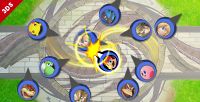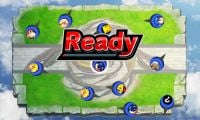StreetSmash
StreetSmash is a mode in Super Smash Bros. for Nintendo 3DS. It is a minigame utilizing the 3DS's StreetPass functionality. The game involves controlling a token, and attempting to knock opponents' tokens off the top-down perspective stage.
Controls
The controls in this mode are a simplified version of those used for standard gameplay. Players move their token with the Circle Pad and can attack opponents by ramming into them using the A button. Holding down the A button allows for a charged attack with greater power but additional vulnerability before and after use, similar to a smash attack. Players also have access to a shield by using the R button. Players can also dodge in any given direction by moving the circle pad in that direction, and can counterattack with the A button if an attack is shielded or dodged at the last second; if the game detects a player is counterattacking successfully, the attack will charge and release instantly, even if the player does not release the attack button. Tokens accumulate damage just like in normal gameplay, which is visible as their colour changing from blue to green to yellow to orange to red to black.
Modes
There are five different modes in StreetSmash: StreetSmash, Practice, Profile, Records, and Tutorial.
StreetSmash
StreetSmash lets players battle people they have met using StreetPass who also have Super Smash Bros. for Nintendo 3DS. All opponents are CPU-controlled. The maximum number of players that can be challenged simultaneously is 12. Before the battle, there is a list that shows who has been met via StreetPass; their greetings and stats can be viewed here. If an opponent has their token set to a character the player has not unlocked yet nor purchased as DLC, a "?" token will be used in place of that character. After finishing the battle, the player will be awarded with coins, and if the player emerges victorious, a custom part or a trophy.
The player is awarded a gold bonus for playing against people encountered via StreetPass and for winning. Each of these gold bonuses increase depending on the number of opponents.
Practice
In Practice mode, the player is given the option to fight CPU opponents in StreetSmash. The number of CPU opponents can be chosen, up to a maximum of 12 CPUs. Players will gain gold at a slower rate in Practice as opposed to StreetSmash, and custom parts will not be awarded.
Profile
Profile lets players change their token and greeting. The player's token can be chosen from all unlocked/downloaded characters except for Mii Fighters. The greeting is 16 characters long and is shown in a 2-line format where the first 8 characters are on the top line and the last 8 are on the bottom, regardless of spaces. The player's default token is chosen at random, unlike with their online profile avatar where Mario is the default.
Records
Records lets players view up to 5 past fights. Players can view their opponent's info and the results for the match. Pressing the X button lets players view which character token was fought most, survived most, and was easiest K.O'd.
Tutorial
Tutorial lets players view the tutorial of StreetSmash that is shown the first time StreetSmash is opened.
Challenges
- Playing StreetSmash for the first time unlocks Lightning Falcon Kick.
- StreetPassing with 5 other players unlocks the Lv. 2 Shinespark Power.This is the only StreetSmash-related Challenge which cannot be completed in Practice mode.
- Getting 10 KOs by knocking opponents into other opponents unlocks the Mugly trophy.
- Getting 20 KOs by knocking opponents into other opponents unlocks the Koopa Troopa (green) trophy.
- Getting at least 20 KOs by counterattacking unlocks a First Striker Agility Badge.
Trivia
- The music played during StreetSmash is a retro-style remix of the game's main theme.
- Although two different versions of the game cannot Smash together, they can still participate in this mode with each other.
- Despite being silent when being KO'd normally, Pac-Man and Mr. Game & Watch make the iconic Pac-Man death sound and the Judgement #9 ping sound when being KO'd respectively.
- StreetSmash bears a strong resemblance to the game Ohajiki, a game where players flick small coin-shaped pieces to hit other pieces and the base concept which eventually lead to Super Smash Bros..
| Super Smash Bros. for Nintendo 3DS menu items | |
|---|---|
| Smash | Smash (Solo · Group · Time · Stock · Team Battle) · Rules |
| Smash Run | Solo · Group · Custom · Select Music |
| Games & More | Classic · All-Star · Stadium (Multi-Man Smash · Target Blast · Home-Run Contest) · Training · Custom · amiibo · Vault (Trophies · Trophy Rush · Album · Replays · Sounds · Records · Tips) · Options (Controls · Sound · Character Outline · Damage Display · Internet Options) |
| Online | Spectator Mode · With Anyone (For Fun · For Glory) · With Friends · Conquest · Share |
| Other | Challenge · StreetPass · Wii U |

